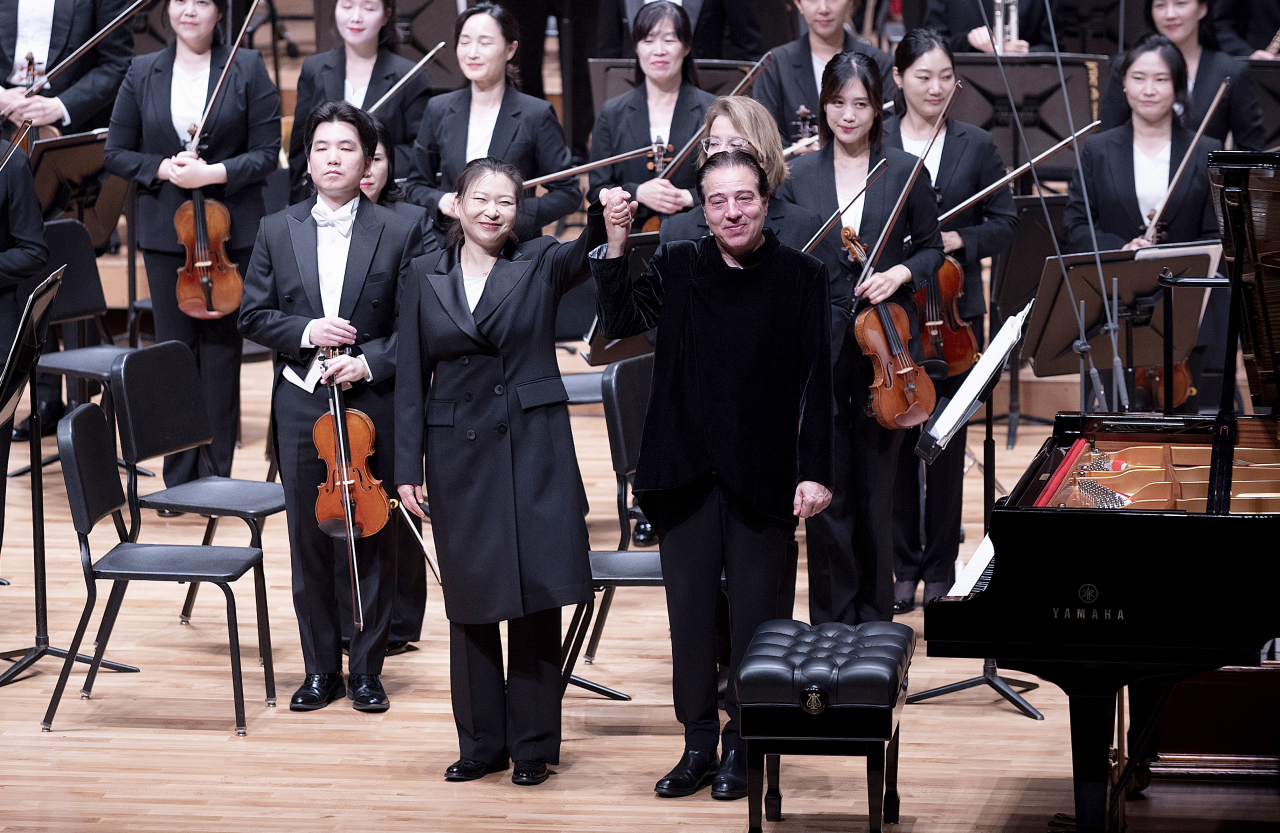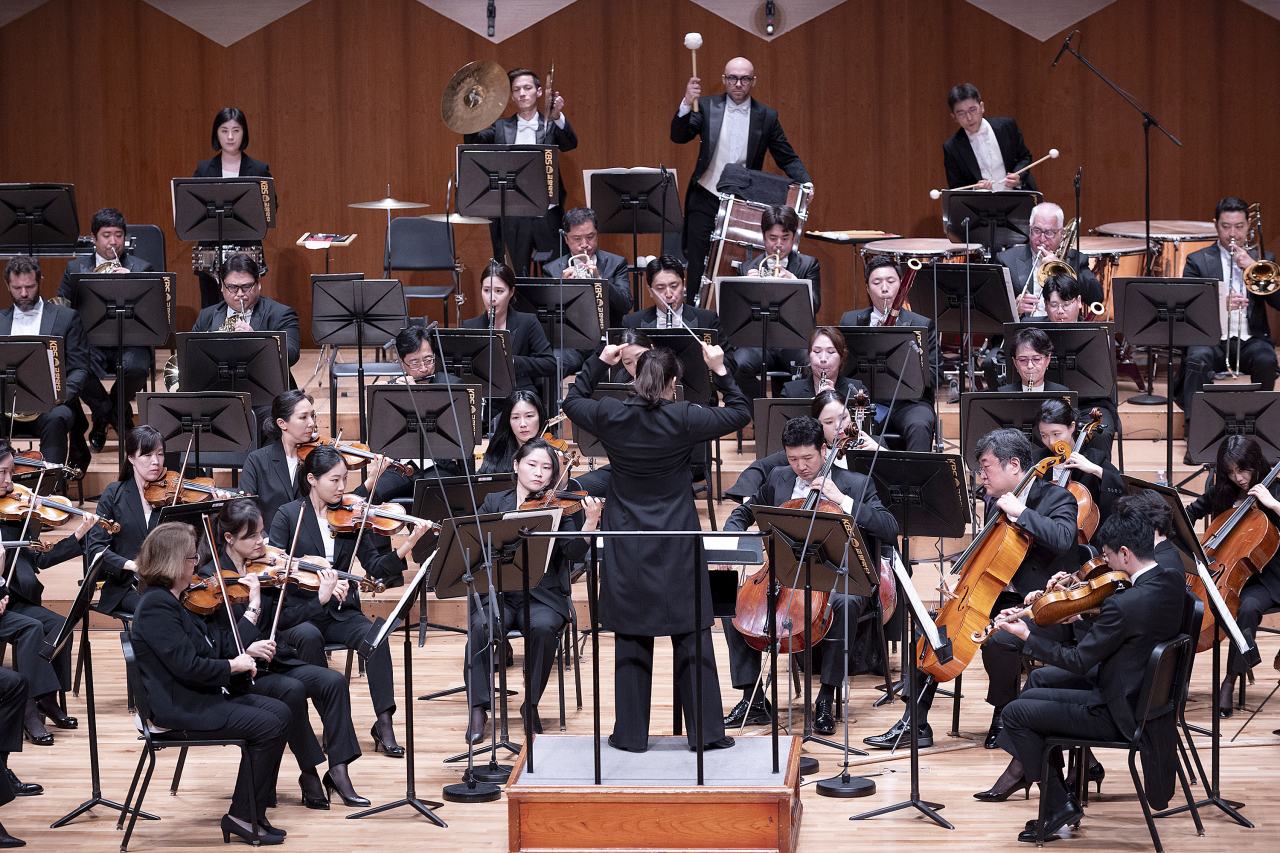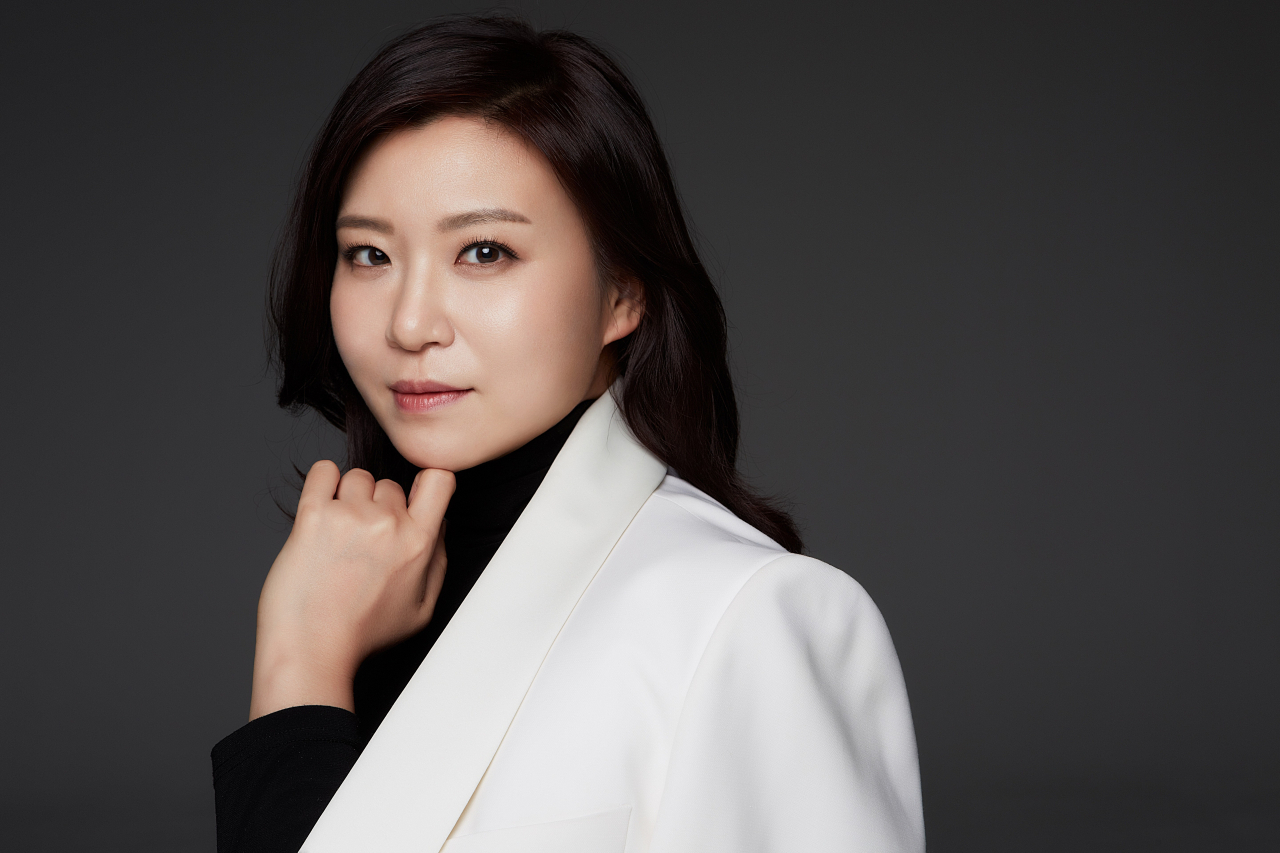 |
Korean conductor Sung Shi-yeon and Turkish pianist and composer Fazil Say stand after performing Say's "Water (Su) for piano and orchestra, Op.45" with the KBS Symphony Orchestra at the Seoul Arts Center on Tuesday. (KBS Symphony Orchestra) |
When Korean conductor Sung Shi-yeon took the stage at the Seoul Arts Center on Tuesday night to lead the Korean Symphony Orchestra, she chose some pieces that are unfamiliar to the public.
Despite the risk of losing members of the audience, who tend to be less enthusiastic about such modern or unfamiliar pieces, Sung introduced Fazil Say’s "Water (Su) for piano and orchestra, Op.45" for the first time in Korea.
With the piece and Carl Nielsen’s "Helios Overture, Op.17," which depicts the sun rising over a serene sea, Sung said she hopes to remind us “to cherish and love our Earth. In that sense, it can really raise awareness and through music, allow us to feel a certain sense of nature's beauty.”
The Korean maestro, who currently serves as the principal guest conductor of the Auckland Philharmonia Orchestra in New Zealand, is known for selecting lesser known pieces, in part as her strategy as a conductor and in part as her wish to bring something new to the table.
"I believe that choosing a piece this orchestra has performed 100 times is a reckless selection,” she said during an interview after her rehearsal with the KBS Symphony Orchestra on Sept. 14.
 |
Sung Shi-yeon leads the Korean Symphony Orchestra during a concert at the Seoul Arts Center on Tuesday. (KBS Symphony Orchestra) |
The 48-year-old conductor, who originally majored in the piano, rose to the international stage after winning the 2006 Georg Solti International Conductors' Competition placing second at the 2007 Gustav Mahler International Conducting Competition. Even though she always loved rehearsing with other musicians and was moved by how the conductor truly creates the music through numerous rehearsals and performances, she never actually thought she would become a conductor herself.
But she suddenly had a desire for the profession after watching Wilhelm Furtwangler, the German composer and conductor who served as principal conductor of the Berlin Philharmonic in the early 1900s. She was captivated by him and the profession that magically gathers passionate musicians into one entity.
"A conductor is a dispensable presence without the performers and can never stand alone. Therefore, I focus on fostering a certain kind of synergy and cooperation with the members (of the orchestra), allowing (each member) to soar," she said about her view on the role of a conductor.
In 2007, she made history by becoming the first female associate conductor of the Boston Symphony Orchestra.
Only a few weeks before her debut with the BSO, however, her mentor passed away. Through this event, Sung lost the guidance of a teacher who could have provided support and encouragement as she navigated the challenges of being a conductor, working with orchestras from diverse cultural backgrounds, and learning through trial and error.
“I wish I had had a mentor at the beginning of my career to show me various ways and advise me on those choices. So for those who are at the beginning of their career, I wish for them to have a mentor and waste less time on finding their paths,” she said.
Despite the challenges, she has become a pioneering female conductor, also earning several “first female” titles. However, Sung believes the recent spotlight on female conductors could be part of a fad that could fade away, as was the case of Latino conductors who gained popularity in the early 2000s.
“When I studied at the Hochschule fur Musik Hanns Eisler Berlin, there were a total of 245 students, and two were female students studying conducting. These days, I am told there are more female students than male students. So, this trend will also disappear someday,” the 47-year-old conductor said.
From 2009 to 2013, Sung was an associate conductor of the Seoul Metropolitan Symphony Orchestra. In 2014, she was appointed the artistic director and chief conductor of the Gyeonggi Philharmonic Orchestra, and during her four-year term, she was praised for elevating the orchestra to the highest level in South Korea.
Sung left the Gyeonggi Philharmonic Orchestra, looking to improve her skills as a conductor and venture beyond her comfort zone.
“I personally think that an orchestra cannot surpass the conductor's capabilities. So, the orchestra is like a mirror reflecting the conductor. Therefore, I wanted to go beyond my position then, and continue to grow as a conductor. That way, I believe once I come back to Korea, I can contribute more to Korean music,” she said.
Sung began the 2023/24 season with a performance at the Hollywood Bowl in the US, leading the Los Angeles Philharmonic and performing with rapidly rising Korean pianist Lim Yun-chan. Going forward, she has more performances with world renowned orchestras, including a concert with the Bavarian Radio Symphony Orchestra in November and a performance with the Royal Philharmonic Orchestra in the UK in February 2024. Additionally, she has debut performances scheduled with orchestras such as the Detroit Symphony and the Vancouver Symphony.
 |
Sung Shi-yeon (Park Yong-bin) |






![[Weekender] Korea's traditional sauce culture gains global recognition](http://res.heraldm.com/phpwas/restmb_idxmake.php?idx=644&simg=/content/image/2024/11/21/20241121050153_0.jpg)
